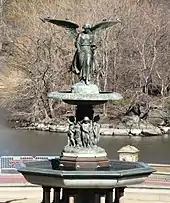Harlem Meer
Harlem Meer is a lake at the northeast corner of New York City's Central Park. It lies west of Fifth Avenue, south of 110th Street, and north of the Conservatory Garden, close to the Harlem and East Harlem neighborhoods of Manhattan. The Meer has a meandering shoreline that wraps around the bluff that contains the remains of gun emplacements erected during the War of 1812, but never used. After the completion in 1966 of the Lasker skating rink and swimming pool, the Harlem Meer was reduced to 11 acres (45,000 m2) in area and 0.75 miles (1.21 km) in circumference.
| Harlem Meer | |
|---|---|
 The Harlem Meer and Dana Discovery Center (far shore) | |
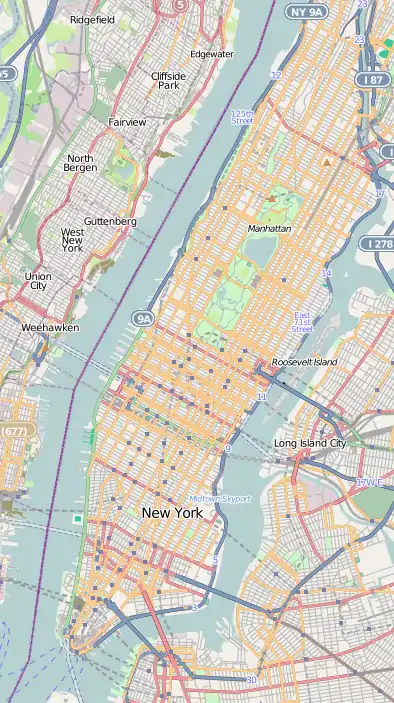 Harlem Meer 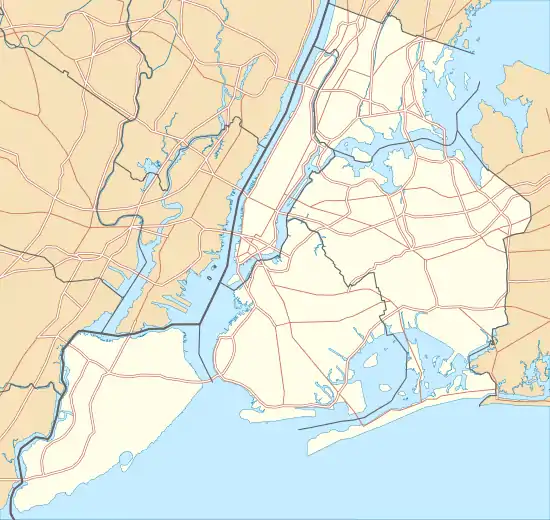 Harlem Meer 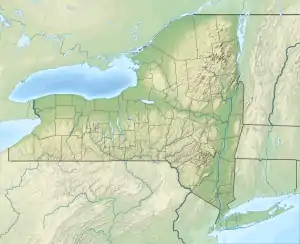 Harlem Meer | |
| Location | Central Park, Manhattan, New York City, New York, USA |
| Coordinates | 40°47′47.8″N 73°57′6″W |
| Type | lake |
History
Creation
The Harlem Meer, named after the nearby neighborhood of Harlem and the Dutch word for "lake", occupies the northeast corner of Central Park, close to North Woods and North Meadow. Both sections of the park were added to the original park site, which originally ended at 106th Street. The Meer, as referred by Central Park designers Frederick Law Olmsted and Calvert Vaux, was excavated at the lowest-lying section of the park. At the time, the Meer was part of Harlem Creek, a semi-brackish, partly tidal wetland, which drained slowly into the East River.[lower-alpha 1][2]:46 It separated the former suburb of Harlem to the north from the lower part of Manhattan island. To avoid the swamp, the Boston Post Road detoured westward into the future park site, rising to cross McGowan's Pass (alternatively McGown's Pass).[3][2]:46
The creation of the Meer and its adjacent wooded landscape was carried out by Andrew Haswell Green, to Olmsted and Vaux's specifications, from 1861, when Olmsted had been relegated to an advisory capacity.[4][5]:193–195
Modifications
In the 1940s, a concrete shore and lake bed were installed, which made the Meer inhospitable for wildlife.[2]:48 In 1962, the city announced that Lasker Rink would be built above the mouth of the Loch, on the southwestern corner of Harlem Meer.[6] The work shrunk the Meer from 10.6 acres (4.3 ha) to 8.1 acres (3.3 ha), and the Meer was temporarily drained as part of the project.[7] When completed in 1966, the facility served as an ice rink in winter and Central Park's only swimming pool in summer.[2]:48[8] In 1973, the Harlem Meer's boathouse was renovated in anticipation for conversion into a restaurant.[9]
.jpg.webp)
The Harlem Meer was restored in 1988–1993 by the Central Park Conservancy. The concrete shore was removed and replaced by a more natural shoreline. As part of the restoration, the Meer was dredged and 34,000 cubic yards (26,000 m3) of sediment and debris were removed.[10][11] On the north shore, the Conservancy built the Charles A. Dana Discovery Center, the first information center at the north end of Central Park. The 14,000-square-foot (1,300 m2) building was designed by the architects Buttrick White & Burtis in a style intended to harmonize with Calvert Vaux's original Victorian park structures.[12][13] A restaurant was originally planned along with the discovery center.[11]
A $150 million renovation of Lasker Rink was officially announced in 2018,[14] requiring that the rink be closed between late 2021 and 2024.[15][16][17] As part of the plan, the portion of the Loch and Harlem Meer under the lake would be restored to a more natural state, and a boardwalk would be added along the newly restored Loch. A new rink would be built to the east of the Loch and would be set within a slope, containing a new pool that would be located at a lower elevation than the existing pool.[15]
Activities
The waterside plaza next to the Dana Discovery Center is currently the site for the Sunday afternoon Harlem Meer Performance Festival, from mid-June to the first week of September. Catch-and-release fishing is a favorite summertime occupation along the Meer's banks. Besides the usual yellow perch and crappie, anglers have reported catches of the predatory Asian northern snakehead, Channa argus, a notoriously invasive species.[18]
An island in the Meer provides a retreat for waterfowl, particularly black-crowned night herons. The Meer also has a resident population of muskrats.
In literature
Albert Finch Bellows's A Description of the New York Central Park, published in 1869, contains early illustrations of the Harlem Meer.
Ron P. Swegman's collection of fly-fishing essays, Small Fry: The Lure of the Little, includes details of the Meer's history, and chronicles Swegman's experiences while fly-fishing there in the early years of the 21st century.[19]
Gallery
 A Detail of the 1859 Central Park Map, Before the Design of the Harlem Meer was Completed
A Detail of the 1859 Central Park Map, Before the Design of the Harlem Meer was Completed.jpg.webp) A Detail of an 1868 Map of Central Park including the Harlem Meer (aka Harlem Lake)
A Detail of an 1868 Map of Central Park including the Harlem Meer (aka Harlem Lake)_p182_Museum_and_Restaurant_from_Harlemer_Meer.jpg.webp) An 1869 View of the Harlem Meer Looking South
An 1869 View of the Harlem Meer Looking South_p184_The_Harlemer_Meer.jpg.webp) An 1869 View from the Northwest Corner of the Meer
An 1869 View from the Northwest Corner of the Meer_p185_Harlem_Meer_and_Old_Fortifications_with_Restaurant.jpg.webp) An 1869 View from the Northeast Corner of the Meer
An 1869 View from the Northeast Corner of the Meer A detail of an 1873 Central Park Map, including the Harlem Meer
A detail of an 1873 Central Park Map, including the Harlem Meer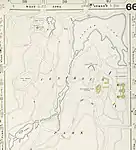 1902 Sanborn Insurance Map including the Harlem Meer (aka Harlem Lake)
1902 Sanborn Insurance Map including the Harlem Meer (aka Harlem Lake) Detail of North Facade of Dana Discovery Center
Detail of North Facade of Dana Discovery Center Entrance to the Dana Discovery Center
Entrance to the Dana Discovery Center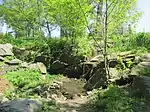 Spring that feeds Harlem Meer from North Meadow
Spring that feeds Harlem Meer from North Meadow Canada goose flying into the meer west of the Dana Discovery Center
Canada goose flying into the meer west of the Dana Discovery Center
References
Notes
- Harlem Commons, as the area was known, was disputed between the City of New York and the heirs of the Harlem freeholders for most of the 18th century. It was divided into house lots and sold in 1825.[1]
Citations
- James Riker, Harlem (City of New York): its origin and early annals 1881, p. 472f.
- Kadinsky, Sergey (2016). Hidden Waters of New York City: A History and Guide to 101 Forgotten Lakes, Ponds, Creeks, and Streams in the Five Boroughs. Countryman Press. pp. 46–48. ISBN 978-1-58157-566-8.
- "Early New York History: Old Days In Yorkville And Harlem" 1893
- "Andrew H. Green and Central Park". The New York Times. October 10, 1897. ISSN 0362-4331. Retrieved April 2, 2019.
- Rosenzweig, Roy & Blackmar, Elizabeth (1992). The Park and the People: A History of Central Park. Cornell University Press. ISBN 0-8014-9751-5.
- "Central Park to Get Swimming Pool and Ice Rink; Combined 110th St. Facilities Will Cost $l,800,000". The New York Times. 1962-02-24. ISSN 0362-4331. Retrieved 2020-01-19.
- "Go to the Park, Get Stuck in the Mud, Cause a Big Commotion, and Then See What Mother Has to Say; LAKE BED IS FUN TO GET STUCK IN; Children Find Diversion in Drained Harlem Meer". The New York Times. 1964-07-31. ISSN 0362-4331. Retrieved 2020-01-19.
- "Lindsay and Hoving Give New Skating Rink a Whirl". The New York Times. 1966-12-22. ISSN 0362-4331. Retrieved 2020-01-19.
- Jr, Nathaniel Sheppard (1973-08-03). "The Harlem Meer Beingrevitalized". The New York Times. ISSN 0362-4331. Retrieved 2020-01-19.
- Central Park Conservancy, 1989-92.
- Kennedy, Shawn G. (1993-05-09). "A Nature Center Blooms in Central Park Woodlands". The New York Times. ISSN 0362-4331. Retrieved 2020-01-19.
- Arcidi, Philip (1993-01-12). "Learning by the Rules" (PDF). Progressive Architecture. ISSN 0362-4331. Retrieved 2020-05-01.
- Stephens, Suzanne (1990-01-18). "Currents; Towers and Turrets at Harlem Meer". The New York Times. ISSN 0362-4331. Retrieved 2020-01-19.
- Durkin, Erin (July 18, 2018). "Central Park's Lasker pool and ice rink set for $150 million makeover". nydailynews.com. Retrieved April 17, 2019.
- Barron, James (2019-09-18). "$110 Million to Fix Central Park Section Far From 'Billionaire's Row'". The New York Times. ISSN 0362-4331. Retrieved 2020-01-19.
- Cohen, Li Yakira (September 18, 2019). "Central Park's $150M redesign focuses on north end improvements". AM New York. Newsday. Retrieved September 19, 2019.
- Glasser-Baker, Becca (September 18, 2019). "Central Park to get new, improved pool and ice-skating rink". Metro US. Retrieved September 19, 2019.
- "'Fishzilla' loose in Central Park lake"; accessed 5 May 2013.
- The Whitefish Press, 2009
External links
| Wikimedia Commons has media related to Harlem Meer. |
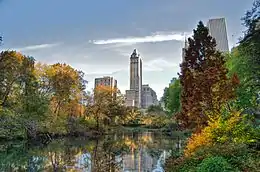

.jpg.webp)
